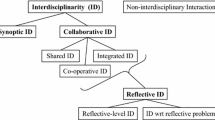Abstract
Interdisciplinary integration has fundamental limitations. This is not sufficiently realized in science and in philosophy. Concerning scientific theories there are many examples of pseudo-integration which should be unmasked by elementary philosophical analysis. For example, allegedly over-arching theories of stress which are meant to unite biology and psychology, upon analysis, turn out to represent terminological rather than substantive unity. They should be replaced by more specific, local theories. Theories of animal orientation, likewise, have been formulated in unduly general terms. A natural history approach is more suitable for the study of animal orientation. The tendency to formulate overgeneral theories is also present in evolutionary biology. Philosophy of biology can only deal with these matters if it takes a normative turn. Undue emphasis on interdisciplinary integration is a modern variant of the old unity of science ideal. The replacement of the ideal by a better one is an important challenge for the philosophy of science.
Similar content being viewed by others
References
Arnold, G.P.: 1974, ‘Rheotropism in fishes’,Biological Reviews of the Cambridge Philosophical Society 49, 515–576.
Bechtel, W.: 1983, ‘The Evolution of our Understanding of the Cell: a Study in the Dynamics of Scientific Progress’,Studies in the History and Philosophy of Science 4, 309–356.
Bechtel, W.: 1986a, ‘Building Interlevel Theories’, in P. Weingartner and G. Dorn (eds.),Foundations of Biology, Hölder-Pichler-Tempsky, Vienna, pp. 65–97.
Bechtel, W.: 1986b, ‘The Nature of Scientific Integration’, in W. Bechtel (ed.),Integrating Scientific Disciplines, Nijhoff, Dordrecht.
Bechtel, W.: this issue, ‘Integrating Sciences by Creating New Disciplines: the Case of Cell Biology’.
Brandon, R.: 1990,Adaptation and the Environment. Princeton University Press, Princeton.
Burian, R.: 1985, ‘On Conceptual Change in Biology: The Case of the Gene’, in D. Depew and B. Weber (eds.),Evolution at a Crossroads, MIT Press, Cambridge Mass., pp. 21–41.
Burian, R.: 1988, ‘Challenges to the Evolutionary Synthesis’,Evolutionary Biology 21, 247–269.
Burian, R.: this issue, ‘Unification and Coherence as Methodological Objectives in the Biological Sciences’.
Byerly, H.C. and R.E. Michod: 1990, ‘Fitness and Evolutionary Explanation’,Biology and Philosophy 5, 1–22.
Darden, L.: 1992,Theory Change in Science: Strategies from Mendelian Genetics, Oxford University Press, New York.
Darden, L. and N. Maull: 1977, ‘Interfield Theories’,Philosophy of Science 44, 43–64.
Fraenkel, G.S. and D.L. Gunn: 1961,The Orientation of Animals, Dover Publications, New York.
Grime, J.P.: 1979.Plant Strategies and Vegetation Processes, Wiley, Chichester.
Ho, M.-W. and S.W. Fox: 1988,Evolutionary Processes and Metaphors, Wiley, Chichester.
Hull, D.L.: 1981, ‘Reduction in Genetics’,Journal of Medicine and Philosophy 6, 125–143.
Hull, D.L.: 1988a, ‘A Mechanism and its Metaphysics: an Evolutionary Account of the Social and Conceptual Development of Science’,Biology and Philosophy 3, 123–155.
Hull, D.L., 1988b,Science as a Process, an Evolutionary Account of the Social and Conceptual Development of Science, University of Chicago Press, Chicago.
Kitcher, P., 1989, ‘Explanatory Unification and the Causal Structure of the World’, in P. Kitcher and W.C. Salmon (eds.),Scientific Explanation, University of Minnesota Press, Minneapolis, pp. 410–505.
Lazarus, R.S.: 1966,Psychological Stress and the Coping Process, McGraw-Hill, New York.
Levins, R.: 1966, ‘The Strategy of Model Building in Population Biology’,American Scientist 54, 421–431.
Levins, R.: 1968,Evolution in Changing Environments, Princeton University Press, Princeton.
Mikhail, A.: 1985, ‘Stress, a Psychophysiological Conception’, in A. Monat and R.S. Lazarus (eds.),Stress and Coping, an Anthology. Columbia University Press, New York, pp. 30–39 (original article 1981).
Mills, S. and J. Beatty: 1970, ‘The Propensity Interpretation of Fitness’,Philosophy of Science 46, 263–286.
Quine, W.V.O.: 1953,From a Logical Point of View, MIT Press, Cambridge Mass.
Quine, W.V.O.: 1960,Word and Object, MIT Press, Cambridge Mass.
Schaffner, K.F.: 1967, ‘Approaches to Reduction’,Philosophy of Science 34: 137–147.
Schaffner, K.F.: 1976 ‘Reduction in Biology; Prospects and Problems’, in R.S. Cohen et al. (eds.)Boston Studies in the Philosophy of Science 32, Reidel, Dordrecht, pp. 613–632.
Schaffner, K.F.: 1980, ‘Theory Structure in the Biomedical Sciences’,Journal of Medicine and Philosophy 5: 57–97.
Schaffner, K.F.: 1992,Discovery and Explanation in Biology and Medicine, University of Chicago Press, Chicago.
Schaffner, K.F.: this issue, ‘Reduction and the Neurobiology of Mind’.
Selye, H.: 1983, ‘The Stress Concept: Past, Present and Future’, in C.L. Cooper (ed.),Stress Research, Issues for the Eighties, Wiley, Chichester, pp. 1–20.
Sloep, P.B. and W.J. van der Steen: 1988, ‘A Natural Alliance of Teaching and Philosophy of Science’,Educational Philosophy and Theory 20, 24–32.
Sober, E.: 1984,The Nature of Selection, MIT Press, Cambridge Mass.
Steen, W.J. van der: 1984, ‘Methodological Aspects of Migration and Orientation in Fishes’, in G.D. McCleave et al. (eds.),Mechanisms of Migration in Fishes, Plenum, New York, pp. 421–444.
Steen, W.J. van der: 1990a, ‘Interdisciplinary Integration in Biology? An Overview’,Acta Biotheoretica 38, 23–36.
Steen, W.J. van der: 1990b, ‘Concepts in Biology: a Survey of Practical Methodological Principles’,Journal of Theoretical Biology 143, 383–403.
Steen, W.J. van der: 1993,A Practical Philosophy for the Life Sciences, SUNY Press, Albany.
Steen, W.J. van der and H. Kamminga: 1991, ‘Laws and Natural History in Biology’,British Journal for the Philosophy of Science 42: 445–467.
Steen, W.J. van der and A. ter Maat: 1979, ‘Theoretical Studies on Animal Orientation I. Methodological Aspects of Classifications’,Journal of Theoretical Biology 79: 223–234.
Steen, W.J. van der and M. Scholten: 1985, ‘Methodological Problems in Evolutionary Biology. IV. Stress and Stress Tolerance, and Exercise in Definitions’,Acta Biotheroretica 34: 81–90.
Steen, W.J. van der and P.B. Sloep: 1988, ‘Mere Generality is not Enough’,Biology and Philosophy 3, 217–219.
Steen, W.J. van der and P.J. Thung: 1988,Faces of Medicine, a Philosophical Study, Kluwer, Dordrecht.
Author information
Authors and Affiliations
Rights and permissions
About this article
Cite this article
Van Der Steen, W.J. Towards disciplinary disintegration in biology. Biol Philos 8, 259–275 (1993). https://doi.org/10.1007/BF00860429
Issue Date:
DOI: https://doi.org/10.1007/BF00860429




